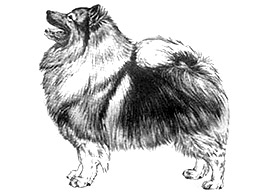Keeshond Breed Standard
Last updated: 24 Feb 2015
A breed standard is the guideline which describes the ideal characteristics, temperament, and appearance of a breed and ensures that the breed is fit for function with soundness essential. Breeders and judges should at all times be mindful of features which could be detrimental in any way to the health, welfare or soundness of this breed.

Kennel Club, London 1994
-
Group:
Group 7 (Non Sporting)
-
History:
-
General Appearance:
Short, compact body, confident carriage. Fox-like head with small pointed ears, alert expression, large ruff, well feathered tail curled over back. Clear differentiation in size between the sexes, with males obviously masculine but never coarse: bitches feminine but without weakness of structure.
-
Characteristics:
Sturdy, intelligent and adaptable, ideal companion, good guard, shows boldly.
-
Temperament:
Bold, alert, friendly with marked guarding tendency.
-
Head And Skull:
Well proportioned, wedge shaped when seen from above; from side showing definite stop. Dark muzzle equal to length of flat skull. Neither coarse nor snipey. Nose black.
-
Eyes:
Dark, medium size, almond shaped, obliquely set. Well defined 'spectacles' shown as a delicately pencilled black line slanting from outer corner of eye to lower corner of ear, coupled with distinct marking and shading forming expressive short eyebrows.
-
Ears:
Dark, small ivy-leafed in shape. Erect, velvety texture. Well set on head, neither too wide nor meeting.
-
Mouth:
Jaws strong, with a perfect, regular and complete scissor bite, i.e. the upper teeth closely overlapping the lower teeth and set square to the jaws. Lips black.
-
Neck:
Moderately long and arched, covered with thick, profuse coat forming large ruff.
-
Forequarters:
Shoulders well sloped. Straight front of medium width with good bone.
-
Body:
Short, compact; length from withers to tail equal to height at withers, well sprung in rib. Good depth of brisket.
-
Hindquarters:
Strong muscled, hindlegs straight when viewed from behind. Hock showing slight angulation when viewed from side, profuse light coloured trousers down to hocks.
-
Feet:
Well padded, round, cat-like, tight, cream in colour; black nails.
-
Tail:
Moderately long, high set, tightly curled over back, double curl highly desirable. Light plume on top where curled, with black tip, carried closely at all times.
-
Gait/Movement:
Clean, brisk, straight and sharp.
-
Coat:
Harsh, off standing, straight. Dense ruff, well feathered on forelegs and profuse trousers, not feathered below hock. Soft, thick, light-coloured (not tawny) undercoat. Never silky, wavy or woolly, nor forming a parting on back. Any shortening of the coat which alters the natural outline should be penalised, with the exception of feet and pasterns which may be lightly trimmed.
-
Colour:
A mixture of grey and black. Undercoat very pale grey or cream (not tawny). All shades of grey acceptable, body hairs black tipped. Shoulder markings well defined and all markings definite. Forelegs and hocks cream with no black below wrist or hock. Pencilling acceptable.
-
Sizes:
Ideal height:
Dogs 46 cms (18 ins)
Bitches 43 cms (17 ins)
-
Faults:
Any departure from the foregoing points should be considered a fault and the seriousness with which the fault should be regarded should be in exact proportion to its degree and its effect upon the health and welfare of the dog.
-
Notes:
Male animals should have two apparently normal testicles fully descended into the scrotum.
 For owners
For owners
 Members
Members
 Dogs Australia is a not-for-profit organisation advocating for the preservation of purebred dogs through ethical breeding.
It champions the highest standard of animal welfare through education and fostering dog-loving communities.
Internationally recognised and established in 1958 as the Australian National Kennel Council (ANKC),
the organisation promotes responsible dog ownership; maintains the ORCHID* heritable canine diseases database;
funds research into canine diseases; and supports state and territory-based member bodies.
Dogs Australia promotes breed conformation shows and community sports for dogs that fulfil a breed’s natural instincts.
Dogs Australia is a not-for-profit organisation advocating for the preservation of purebred dogs through ethical breeding.
It champions the highest standard of animal welfare through education and fostering dog-loving communities.
Internationally recognised and established in 1958 as the Australian National Kennel Council (ANKC),
the organisation promotes responsible dog ownership; maintains the ORCHID* heritable canine diseases database;
funds research into canine diseases; and supports state and territory-based member bodies.
Dogs Australia promotes breed conformation shows and community sports for dogs that fulfil a breed’s natural instincts.







